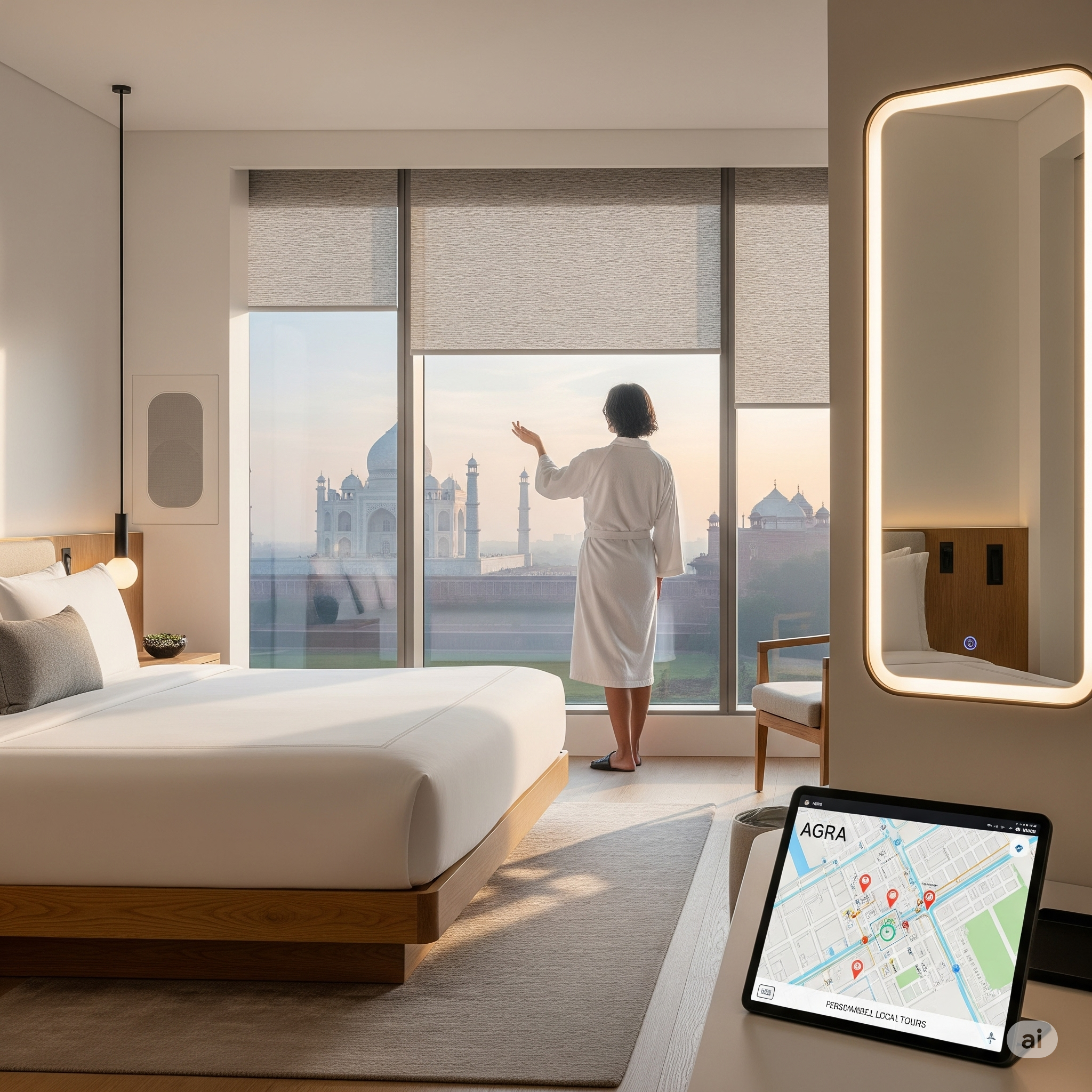Picture your last hotel stay. You likely stood in a queue to check in, fumbled with a keycard, and then spent a few minutes figuring out the thermostat. It’s a familiar, functional process, but rarely a memorable one. Now, imagine a different scenario. You bypass the front desk entirely, unlocking your door with your phone. As you enter, the lights adjust to a soft evening glow, the temperature is already at your preferred 22°C, and a welcome message on the TV suggests a reservation at a nearby restaurant that serves your favorite cuisine. This isn’t a glimpse into a distant future; this is the reality of AI smart hotels.
The hospitality industry is undergoing a profound transformation, moving beyond simple amenities to create deeply personalized and frictionless guest experiences. At the heart of this revolution is Artificial Intelligence, the invisible engine powering a new generation of hotels. This technology is doing more than just adding voice-activated light switches; it is fundamentally reshaping AI hospitality operations. From the back office to the penthouse suite, AI is creating efficiencies and delighting guests in ways we are only beginning to explore. These advancements are defining the new standard for modern travel.
What Makes AI Smart Hotels Truly “Smart”?
The term “smart hotel” often brings to mind futuristic gadgets and talking speakers. While those are part of the equation, the true intelligence of AI smart hotels lies in integration. A truly smart hotel creates a connected ecosystem where all systems—from the Property Management System (PMS) to in-room IoT (Internet of Things) devices—communicate with each other. AI acts as the central “brain,” analyzing data from these disparate sources to make intelligent, autonomous decisions that enhance both the guest experience and the hotel’s bottom line.
Unlike traditional hotels where operations are often siloed, an AI-powered hotel can anticipate needs. For instance, the system knows when a guest has checked out, and can automatically signal housekeeping, adjust the room’s energy settings to a low-power mode, and update room status in the PMS. This level of automation and data-driven action represents a monumental leap in operational efficiency. It’s the difference between a hotel that reacts to requests and one that proactively orchestrates a seamless stay.
The Guest Experience Reimagined in AI Smart Hotels
For today’s traveler, personalization is the ultimate luxury. Guests expect brands to know them and cater to their preferences. AI smart hotels excel at delivering this, turning a standard hotel room into a personal sanctuary.
Hyper-Personalization from Booking to Checkout
The personalization journey in AI smart hotels begins long before a guest arrives. By analyzing data from past stays, loyalty profiles, and even initial booking preferences, a hotel’s AI can prepare a room that feels tailor-made. Imagine a business traveler who always requests a firm pillow and a late checkout. Upon their next booking, the AI can automatically assign a room with the right pillow and pre-approve a late checkout, noting it for housekeeping. This proactive attention to detail creates a powerful sense of being recognized and valued.
This extends to the in-room environment as well. A guest can set their preferred lighting scenes, TV channels, and temperature settings during one stay, and the AI can automatically replicate this environment for all their future visits. This eliminates the minor frictions of settling in and makes the guest feel instantly at home.
The Rise of the AI Concierge in AI Smart Hotels
The traditional concierge is a cornerstone of luxury hospitality, but they can’t be available to every guest 24/7. AI-powered virtual concierges, accessible via in-room tablets or simple voice commands, can. These AI assistants provide instant service and information, handling a wide range of requests that would otherwise tie up front-desk staff. Guests can:
- Request extra towels or room service.
- Book spa treatments or dinner reservations.
- Get real-time recommendations for local attractions based on their interests.
- Control all in-room features like curtains, lights, and entertainment systems.
This frees up human staff to focus on more complex and high-touch interactions, adding a layer of personal service where it matters most, while AI handles the routine requests with speed and efficiency.
Behind the Scenes: Optimizing AI Hospitality Operations
While guest-facing technology gets most of the attention, the most significant impact of AI is often behind the curtain. AI hospitality operations are becoming leaner, more predictive, and more profitable thanks to intelligent automation and data analysis.
Predictive Maintenance and Energy Efficiency
In a large hotel, an out-of-order elevator or a broken AC unit can be a logistical nightmare and a source of guest complaints. AI-powered predictive maintenance systems use sensors to monitor the health of critical equipment in real-time. By analyzing performance data, the AI can predict when a piece of machinery is likely to fail and schedule maintenance before it breaks down. This shifts operations from a reactive to a proactive model, saving money on emergency repairs and preventing service disruptions.
Furthermore, AI is a powerful tool for sustainability. Smart energy management systems can drastically reduce a hotel’s carbon footprint and utility bills. These systems use occupancy sensors to automatically turn off lights and adjust the HVAC in empty rooms or common areas, ensuring energy isn’t wasted. This is a key feature of modern AI smart hotels.
Case Studies: Hotels Leading the AI Revolution
The move toward AI smart hotels isn’t just theoretical. Major hotel chains and luxury properties are already implementing this technology and seeing impressive results.
Case Study 1: Marriott International’s Personalized Marketing
Marriott, one of the world’s largest hotel chains, uses AI to power its customer relationship management (CRM) and marketing efforts. As detailed in reports on hospitality trends, Marriott analyzes vast datasets of guest behavior to deliver highly personalized offers and communications. If a guest frequently books spa treatments, the AI-driven system can send them targeted promotions for new wellness packages. This data-first approach, explained in resources like HubSpot’s guide to marketing automation, has allowed Marriott to increase engagement and drive more direct bookings, fostering greater brand loyalty. They continue to pilot new in-room smart technologies, constantly learning from guest interactions to refine the experience.
Case Study 2: Wynn Las Vegas and the Smart Room Standard
Wynn Las Vegas was one of the first major resorts to set a new standard for the smart room by announcing it would equip all 4,748 of its hotel rooms with an Amazon Echo. This ambitious project aimed to put voice control at the center of the guest experience. Guests could use simple voice commands to control lights, drapery, and the television. While seemingly a simple upgrade, this move fundamentally changed the dynamic of the hotel room. It reduced thousands of calls to the front desk for simple tasks and positioned the Wynn as a technology leader. This early adoption demonstrated the practical power of AI smart hotels and paved the way for more deeply integrated systems across the industry.
The AI Toolkit for Modern Hospitality
Hotel managers don’t need to build their own AI from scratch. A wide range of powerful, user-friendly tools are available to help hotels of any size leverage data and automation.
- Power BI: A business analytics service from Microsoft. Hotel managers can use it to create interactive dashboards that visualize booking trends, guest spending patterns, and operational costs. This helps identify opportunities, such as promoting certain amenities during low-demand periods.
- ChatGPT: This versatile AI from OpenAI can be a massive productivity booster. Use it to draft professional and empathetic responses to online reviews, create engaging social media content, generate descriptions for new packages, or even help train staff on new procedures.
- Specialized Hospitality Platforms: Companies like Revinate and SiteMinder offer AI-powered platforms designed specifically for the hotel industry. They integrate with a hotel’s PMS to automate email marketing, manage online reputation, and optimize pricing across different booking channels.
A Beginner’s Guide to Implementing AI in Your Hotel
Adopting AI doesn’t have to be an expensive, all-or-nothing overhaul. Independent and boutique hotels can take an incremental approach to becoming an AI smart hotel.
- Start with the Data You Have: Begin by consolidating and analyzing the information you already collect. This includes guest feedback from review sites, post-stay surveys, and booking data from your PMS.
- Solve One Problem First: Instead of trying to automate everything at once, pick one specific pain point. For example, if your front desk is constantly bogged down with the same questions, implement an AI chatbot on your website to handle FAQs. This can be easily done with tools that integrate through platforms like Zapier.
- Analyze Feedback with AI: Use a tool like ChatGPT to analyze the text from hundreds of reviews in minutes. Ask it to “Identify the top 5 things guests love about our hotel and the top 3 recurring complaints.” This gives you actionable insights instantly.
- Run a Small Pilot Project: Before investing in new technology for the entire property, test it on a small scale. Install smart thermostats in a few rooms and survey the guests who stay in them to measure the impact on satisfaction and energy usage.
The Future of AI Smart Hotels and Hospitality
The evolution of AI smart hotels is accelerating. We are moving from smart rooms to predictive guest journeys. In the near future, your hotel’s AI will act as a true journey planner. It might message you on the day of your flight to suggest the best time to leave for the airport based on real-time traffic, or have your favorite post-workout smoothie ready for you when you return from the gym.
This technology will also empower staff, not replace them. By automating repetitive administrative tasks, AI will free up hotel employees to focus on what humans do best: providing empathetic, high-touch service and creating memorable personal connections. As outlined in a McKinsey report on AI, the combination of AI efficiency and human creativity is where true value is unlocked. The future of hospitality is a seamless blend of intelligent technology and genuine human warmth.
Cure Writer’s Block & Write Killer Dialogue: The AI Screenwriting Guide
Your Next Plot Twist is One Click Away: The Guide to AI Storytelling
Beat Writer’s Block Forever: The Ultimate Guide to AI Creative Writing



